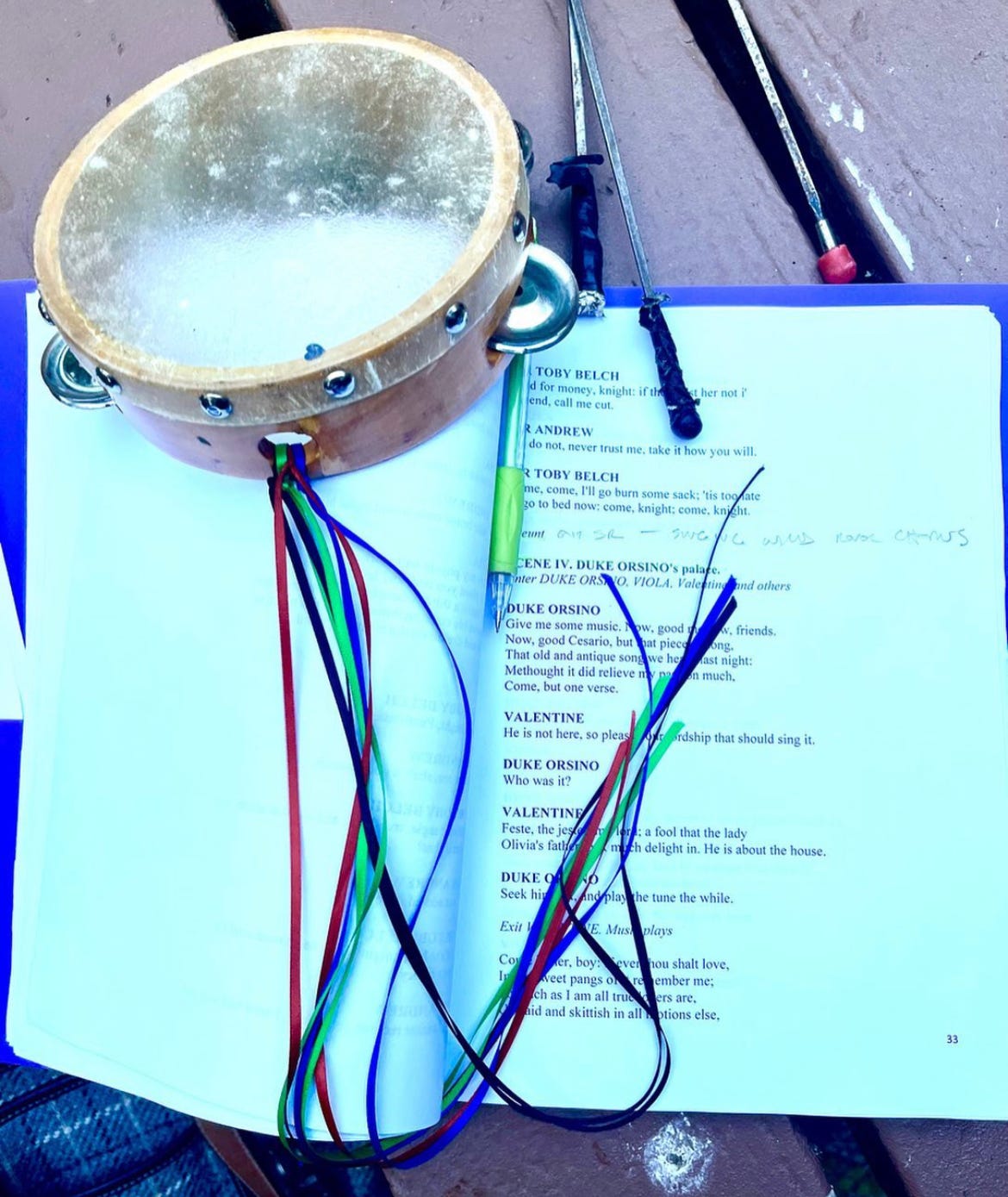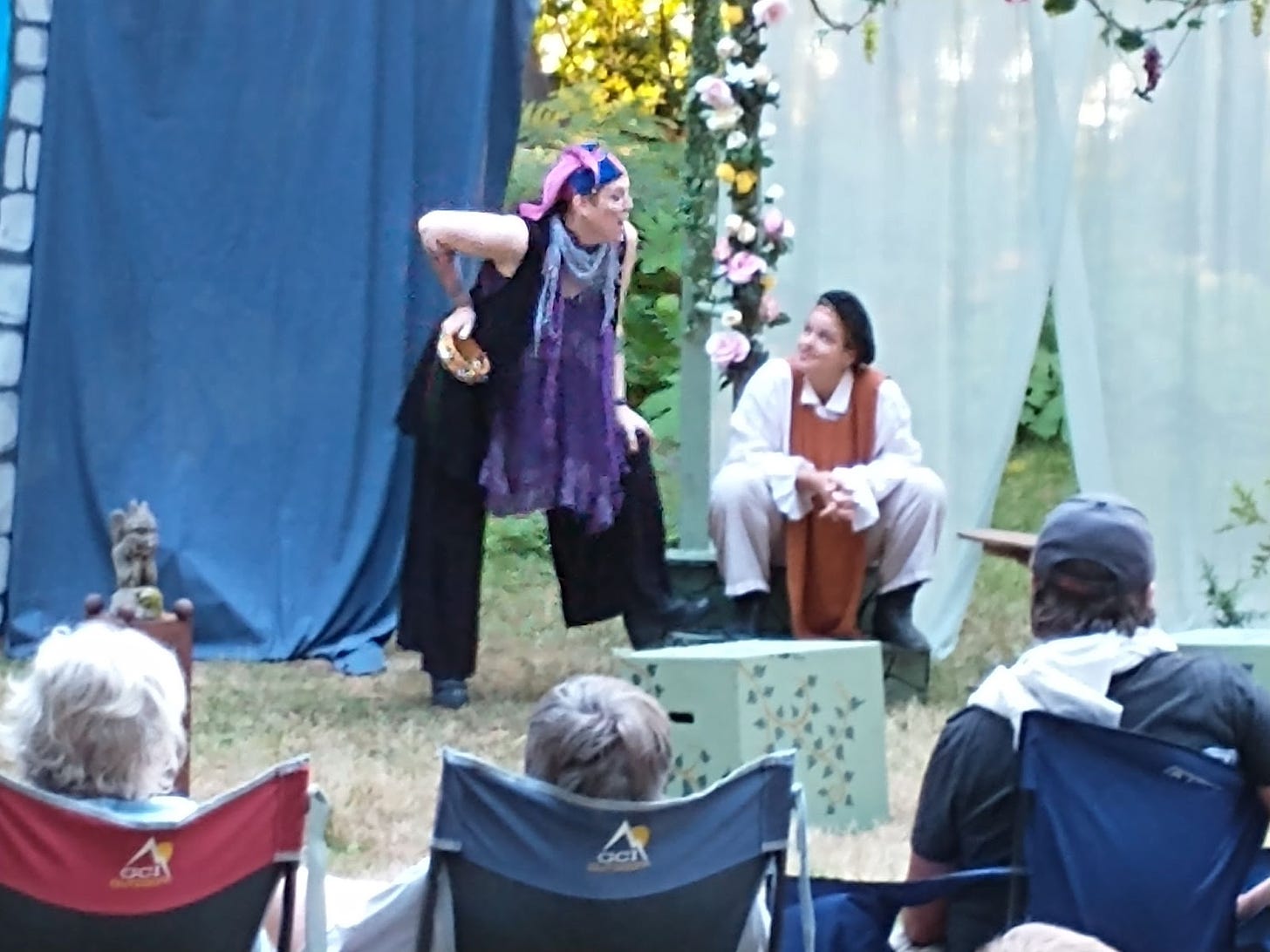Tabor
This week's vocab word is Fool-adjacent, and carries a lot of baggage, even as it was carried in some of mine.
CESARIO: God save you sir, and your music. Dost thou live by thy tabor?
FESTE: No, sir, I live by the church.
CESARIO: Art thou a churchman?
FESTE: No such matter sir; I do live by the church; for I do live at my house, and my house doth stand by the church.
CESARIO: So mayst thou say that a king lies by a beggar, if a beggar dwell near him; or the church stands by thy tabor, if thy tabor stand by the church.
FESTE: You have said, sir. To see this age! A sentence is but a chevril glove to a good wit—how easily the wrong side may be turned outward.
~Shakespeare, 12th Night

I bought the above tabor just before my senior year in high school, from the early music shop downtown, and I attached the ribbons to it myself. I had an obsession with court jesters, clowns, and sacred Tricksters (9 years later I’d write my MFA thesis on these things). I made my new tabor look like this because I wanted so badly to be an artistic Fool in real life. But how to go about doing this?
I tried joining the SCA (Society for Creative Anachronism) as a teen just out of high school and just starting college, as they sounded like not-quite-LARPers and I was intrigued. Sounded like some fun medieval role play without the dice. And their advertising said they were open to everyone, inclusive before that was a word we bandied about in geekdom. I dressed up as a Fool, brought my tabor with me, and attended a meeting. What followed was the most painfully awkward hour of being ignored that I have ever, ever, experienced, then or since. I think I try that much harder to be overly warm and guiding when n00bs join my variety show now, since I had such a terrible time that hour with the SCA.
Something was triggered by that experience, too, connected to my neurosis about my singing. I’d always been a pretty good singer but received harsh external judgments on same. I was well trained in the rigorous choirs in high school and got even better, but was not upgraded to the elite classical and chamber choir my junior year the way my better-looking and more popular friends were. Halfway through that year of lower level women’s choir the director took me aside and apologized for not putting me in those top choirs with my friends. “If I had known what an intelligent singer you are, what a good ear you have,” said the director, “I would never have kept you here.” Of course, it being a school thing, an actual class, she couldn’t just transfer me right then—it was the middle of the semester. Plus I have a feeling she wanted to keep my voice in that lesser quality group.
Fast forward to 2022, and I finally used my little tabor professionally, as a Fool, in Animal Fire Theatre’s park production of 12th Night. I wrapped it in some of my softer clothes so it wouldn’t rattle around and make noise in my giant suitcase, and even though one of the directors had a purple tambourine that matched my outfit color-wise and was louder, I used my little skin, wood, and beribboned one instead. It was more me, was more of Shakespeare’s time (not that any of the costumes really were super accurate but), and it fit in my cool jacquard pouch they had as part of my costume. In this play, my voice was celebrated unlike anywhere else, even back when I first bought the tabor as a high school senior, when I was finally in those two elite choirs, plus one award-winning acapella group. Even later, when I was cast as a singing Midsummer fairy just out of college (though not given a solo).
After that summer show was over, I left my tabor there in Animal Fire’s props collection. I wonder if it’ll ever get used again.
Those sticklike things with the taped-up button ends on top of the script are fencing foils, another object that epitomizes my theatrical expertise; though I don’t usually prefer to use fencing foils for any theatrical combat, as they disappear onstage, and look like the safe nubbed-ended things they are. But budgets are budgets, and I’d rather stay safe than have a cool-looking weapon that’s unsafe. Anyone that’s ever taken a stage combat class from me will tell you this–I make them repeat the two rules to me rote and often:
Stay Safe
Look awesome
The first rule comes first, and if that one is the only one that can be followed, that’s the one to follow. Of course, ideally we want both.
The story of me joining and becoming an expert at stage combat is an involved one, beginning in the mid-1990s. This story is told in more detail in my memoir that I’m shopping around (and partly in PBFT #6: “One of the Guys,” so I won’t spend a huge amount of time on that here. Suffice to say that I joined a group of professional theatrical combat practitioners at the very end of my undergraduate work, fell completely in love with it (as well as with its lead and choreographer) and proceeded to 1) test in as many weapons as I could; 2) join the special troupe in their series of fights for renfaire; 3) was taken under one of the teachers’ wings, learned how to teach it myself, began teaching it in earnest, till fast-forward ten years later and I’ve written and published a textbook on the subject. But by far my favorite weapon in that whole experience is the rapier, which is the type of sword that Shakespeare would have used in any of his plays that had them. Remember in Hamlet?
HAMLET: What’s his weapon?
OSRIC: Rapier and dagger.
HAMLET: That’s two of his weapons, but, well.*
*Literally one of my favorite jokes in all of Shakespeare. It’s so stupid; I love it so much.
Later, I came to love the staff almost as much but that love came from my training in Japanese martial arts, not European theatrical combat. More on (moron?) all this in my memoir. Anyone know an agent?
So. As you can see. The above picture depicts my theatrical artistic story coming full circle. I do live by my tabor, sir…
“Foolery doth walk about the orb like the sun. It shines everywhere.’”
~Feste again, Shakespeare’s 12th Night




